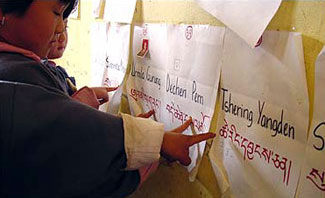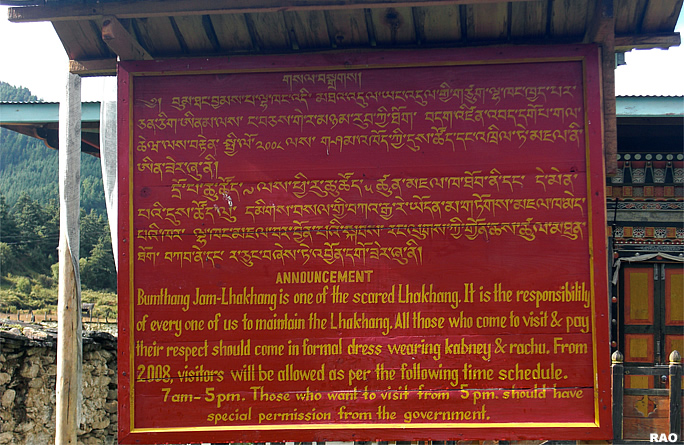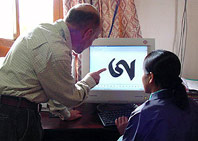|
Dzongkha:
Bhutan's National Language |
 |
Bhutan's
Culture: Dzongkha |
|
 |
Bhutan Information |
|
|
 |
|
Bhutan's
History to be taught in Dzongkha |
 |
 |
| Dzongkha will be introduced as a separate discipline at the pre-university level
and Bhutan history will be taught in Dzongkha in middle secondary schools according to the curriculum and professional support division (CAPSD) of
the education ministry. "A pilot Dzongkha stream like that of commerce
and humanities will be started in 2004 at the plus two level," said Dorji
Wangchuk of CAPSD. "Existing history text books will be translated into
Dzongkha to be taught in classes VII to iX from the 2006 academic session
and for class VIII and X the next year." |
|
These
are some of the steps being taken to promote and standardise the national
language to the English level which were finallised during the fourth
Dzongkha annual conference which ended yesterday. "Additional Dzongkha
teachers, even monks with masters qualification will be recruited to teach
the subject in the schools," Dorji Wangchuk said.
The
annual Dzongkha conference also decided to re-introduce the traditional
method of teaching Dzongkha through Bjo Lha (learning words by spelling
out) and Tsi du (rote learning), in the teachers teaching manual. The Dzongkha
development authority secretary, Dasho Sangay Wangchuk, said the education
sector was the best place to work towards the national policy of improving
the standard of dzongkha. "To improve the standard of Dzongkha, a better
foundation has to be laid early in the learning stage," he said. He added
that Bhutan history could also be best taught in Dzongkha. "Many
important information were lost and pronunciations distorted during the
course of translation.
A history in Dzongkha would be the best to know
our own history." World and Indian history will continued to be taught
in English. On Dzongkha being introduced as a separate stream at the plus
two level, Dorji Wangchuk reasons that it will give students a choice to
pursue higher edcuation either in Sherubtse College or the Institute
for Language and Cultural studies in Semtokha. "This would ease the
shortage of dzongkha lopens in the future," he said.
The
conference also decided to make "fluency in both spoken and written"
Dzongkha as another criteria for promotion, job recruitment, and admission
to educational institutes of higher learning. Prime minister, Lyonpo Jigmi
Thinley, who attended the conference closing said that the usage of Dzongkha
should be made easier according to the changing times. "Dzongkha is
an important national identity and should be preserved and promoted
as much as we can," he said.
| Information on Bhutan |
 |
|






